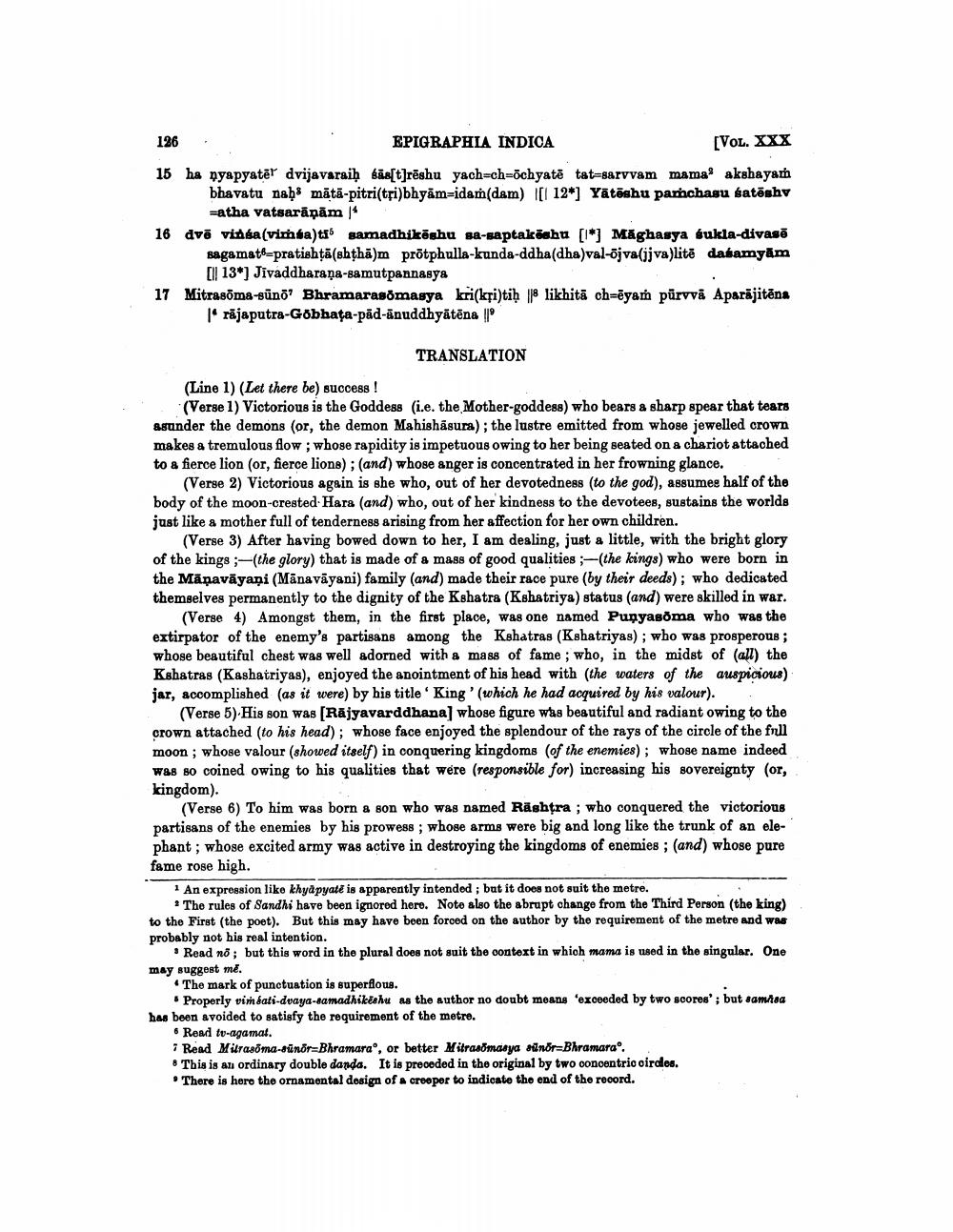________________
126
.
EPIGRAPHIA INDICA
(VOL. XXX
15 ha nyapyatēr dvijavaraiḥ būs[t]rēshu yach-ch=ôchyatē tat-sarvvam mama akshayam
bhavatu nahs mātā-pitri(tri)bhyam-idam(dam) [] 12*] Yātēshu parchagu batēshv
=atha vatsarāņām * 16 dvē vitsa (vimba)t samadhikēghu sa-saptakoshu [*] Māghasya sukla-divasā
sagamatb=pratishtā(shthā)m prātphulla-kunda-ddha(dha)val-õjva(jjva)litē dabamyām
[II 13*] Jivaddharaṇa-samutpannasya 17 Mitrasāma-sūno? Bhramarasomasya kriskļi)tiḥ 18 likhita ch=ēja pūrvvá Aparājitēna
' rājaputra-Gobhata-päd-anuddhyātēna ||
TRANSLATION
(Line 1) (Let there be) success!
(Verse 1) Victorious is the Goddess (.e. the Mother-goddess) who bears & sharp spear that tears agunder the demons (or, the demon Mahishasura); the lustre emitted from whose jewelled crown makes a tremulous flow; whose rapidity is impetuous owing to her being seated on a chariot attached to a fierce lion (or, fierce lions) ; (and) whose anger is concentrated in her frowning glance.
(Verse 2) Victorious again is she who, out of her devotedness (to the god), assumes half of the body of the moon-crested Hara (and) who, out of her kindness to the devotees, sustains the worlds just like a mother full of tenderness arising from her affection for her own children.
(Verse 3) After having bowed down to her, I am dealing, just a little, with the bright glory of the kings -(the glory) that is made of a mass of good qualities;-(the kings) who were born in the Māņavāyani (Mānavāyani) family (and) made their race pure (by their deeds); who dedicated themselves permanently to the dignity of the Kshatra (Kshatriya) status (and) were skilled in war.
(Verse 4) Amongst them, in the first place, was one named Punyasoma who was the extirpator of the enemy's partisans among the Kshatras (Kshatriyas); who was prosperous ; whose beautiful chest was well adorned with a mass of fame; who, in the midst of (all) the Kshatras (Kashatriyas), enjoyed the anointment of his head with the waters of the auspicious) jar, accomplished (as it were) by his title 'King '(which he had acquired by his valour). .
(Verse 5) His son was (Rajyavarddhana) whose figure was beautiful and radiant owing to the crown attached to his head); whose face enjoyed the splendour of the rays of the circle of the frull moon; whose valour (showed itself) in conquering kingdoms (of the enemies); whose name indeed Was so coined owing to his qualities that were (responsible for) increasing his sovereignty (or, kingdom)
(Verse 6) To him was born a son who was named Rāghtra ; who conquered the victorious partisans of the enemies by his prowess ; whose arms were big and long like the trunk of an elephant; whose excited army was active in destroying the kingdoms of enemies ; (and) whose pure fame rose high.
1 An expression like khyapyatt is apparently intended; but it does not suit the metre.
* The rules of Sandhi have been ignored here. Note also the abrupt change from the Third Person (the king) to the First (the poet). But this may have been forced on the author by the requirement of the metre and was probably not his real intention.
Read no; but this word in the plural does not suit the context in which mama is used in the singular. One may suggest me.
• The mark of punctuation is superflous.
. Properly vir bati-dvaya-samadhiktahu as the author no doubt means 'exceeded by two scores'; but samaa has been avoided to satisfy the requirement of the metre.
. Read tv-agamat. 7 Read Mitrasoma sünor Bhramara', or better Mitraamaaya ainor-Bhramarao.
This is an ordinary double danda. It is preceded in the original by two concentric circles. . There is hero the ornamental design of a crooper to indicate the end of the record.




